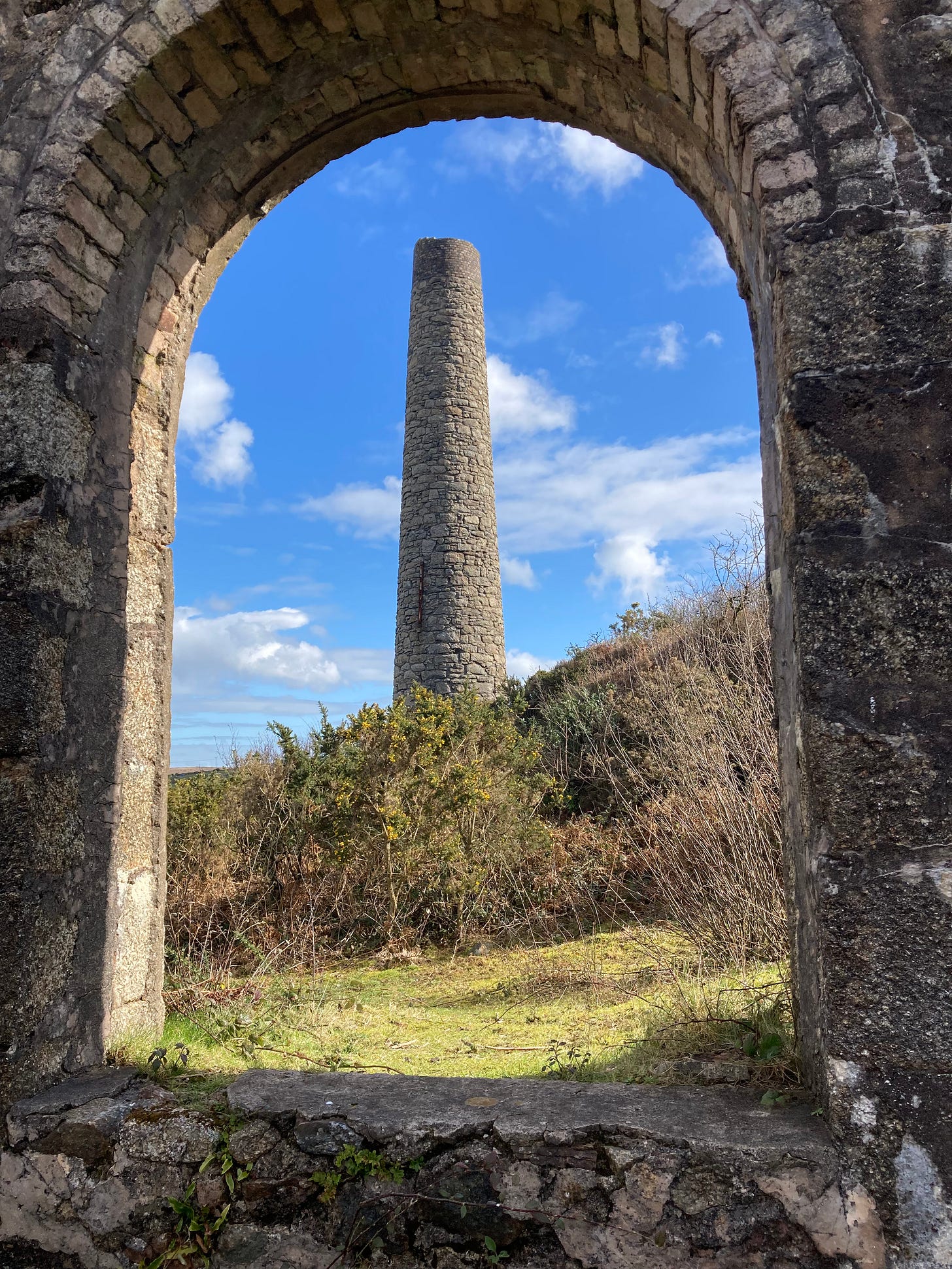
- People always ask you if you’re lost if they live in a place and see that you’re in the place too and you’re looking at a map. It can be socially tricky for someone like me who walks a lot, loves maps, is quite proud of his sense of direction and likes to plan his own routes. During a walk of, say, 13 miles, on paths that are largely new to me, such as the one I did around the outskirts of the Cornish town of St Austell on Tuesday, I might get my map out to consult it, or even just to gaze admiringly at its language and art, as many as two dozen times. That’s potentially a lot of conversations – especially when the terrain is fairly heavily residential – where I have to explain to helpful strangers that I’m definitely not lost. The question always teems with good intentions but the logic behind it is not dissimilar to one that assumes that a gang of women dressed in nurse uniforms in a pub are there to assist with a fellow punter’s triple heart bypass procedure. If there are moments when I need some assistance in finding where I’m going, they’re almost certainly going to be when I don’t have a map in my hand. I now choose my moments of map consultation carefully, sometimes even ducking into a thicket, a pillbox or a derelict engine house to do the job, but on the grass verge beside the A390 in St Austell, I momentarily dropped my guard. A gust of wind blew my dog-eared OS Explorer 107 wide open and a heavyset dishevelled man popped his head out of a driveaway and asked if I had lost my way. I thanked him and, hurrying on, told him I was fine and was just checking my route. However, reinforcing an impression I have received of St Austell, which is that boredom can sometimes be a factor for those who live there, he continued to follow me along the street. “If you need to get anywhere, I can tell you how!” he shouted. A shopping trolley lay on its side a few yards away on the pavement, yet to awake and face its hangover. I had a sudden urge to attach one of those “POLICE AWARE” stickers to it. I told the stranger again that I was fine and escaped down an alley towards the coast. The houses changed, got bigger and whiter, then small and old and colourful with names often teetering on the wrong side of the line between sweet and saccharine, then even bigger and whiter than ever, homes whose views alone were probably worth at least a million pounds of their price tag. I like views but, even if I had such money, I don’t think I’d ever pay that much for one. After all, there are views to be had for free, all over the place. You just have to walk a bit, usually. I cut inland across a golf course. A lone player ran her hand along the heads of the clubs in her bag and sized up an approach shot. I used to really earn my 50 pence per round at moments like this, back in my caddying days. The way I saw it, what was required was a seven-iron, just a soft one, faded in low on the breeze over the left bunker, but I resisted the urge to interfere. My back sang a mournful song at me. The cliff’s fault, winter’s, my car’s, my laptop’s, but golf’s, ultimately. Growing teenage bones and unsupportive 1980s bags full of metal. “You’d probably be an inch taller, if not for golf,” an osteopath once told me. Generally, I have found that chiropractors have been more successful in straightening me out. I was sad to move away from the logical catchment area of my latest one, and while some might argue that I’ve previously relocated for reasons no less niche, you can’t choose where you live solely based on the quantity of reputable experts in the muscoloskeletal field.
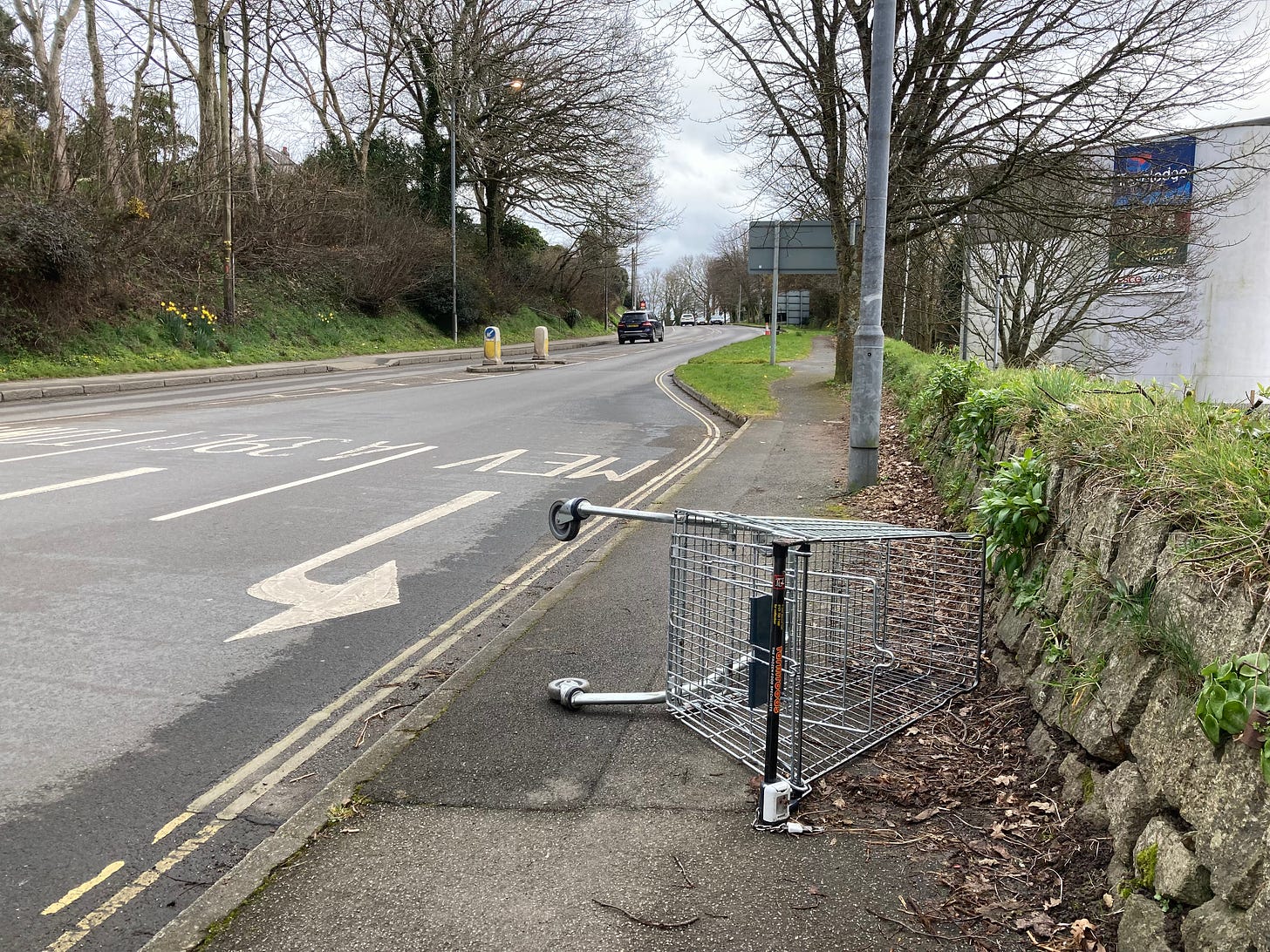
- If you want to see a lot of different sides of Cornwall on foot in one afternoon, I very much recommend a four or five hour circle of St Austell. Start, as I did, in the church car park near the top of the hill at St Blazey Gate. Detour the distance of a full eight-iron shot – an easy seven if you prefer – down the road to have a look at the blackened skeleton someone has put in their front garden then take the watery path north west that skirts Tregrehan Gardens, continue to the Eden Project then up to the China Clay Works beyond Trethurgy, where on a clear day you really get a sense of the zag and zig of the headland. Head downhill through the town centre, then past the joyridden shopping trolleys to Charlestown, where clay used to be transferred to scooners to be taken up to Liverpool and used to make paper or to be carted over to Stoke On Trent to become fancy tea sets and jugs. Consider a stop at Museum Vinyl on the way. They’ve currently got a first pressing of ‘Down By Maple River’ the lone LP by the Canadian psych country band Tapestry. It’s almost impossible to find in the UK and I won’t be buying it because I arguably already have more psych country LPs than one mortal human being could ever require. At £150 it’s not cheap but probably fifty quid less than it would be if you bought it in London or Brighton or Bath. There’s also a shop not far from there where you get two pasties free if you buy ten in one go, although in the smallprint the proprietors point out that they might need one hour’s notice. Fowey, a few miles along the coast to the east, is significantly prettier, but if you are in the mood to eat twelve pasties in one sitting, don’t go expecting to find offers like that there. So, if I didn’t want twelve pasties or a rare country psych record, why did I come to St Austell? The answer is that I’m terminally interested in stuff. Specifically, in this case, I was interested in the pyramid a mile north of the town borders at Carluddon. Everywhere you go around here, for miles around, its almost volcanic-looking peak dominates the landscape, and, the more I saw it, the stronger I felt a need to walk to it from the lower ground and find out more about it. What I found out is that it’s a clay dump which has been there since the 1930s, it’s known locally as Scredda Mountain and The Cornish Alps, and there’s a lot of local pride concerning it, to the extent that when there was a plan to take it down a few years ago, a local petition saved it. I’m only going to be living in Cornwall for a short time and while I am I find satisfaction in ticking adventures like this off my list. I don’t want to be sitting there in a couple of year’s time, in my next living room, in some other county, and suddenly think, “I can’t believe I lived in Cornwall all those months and didn’t once walk to that massive slag heap near the roundabout just south of Penwithick and the electric vehicle charging station! What a neglectful twat!”
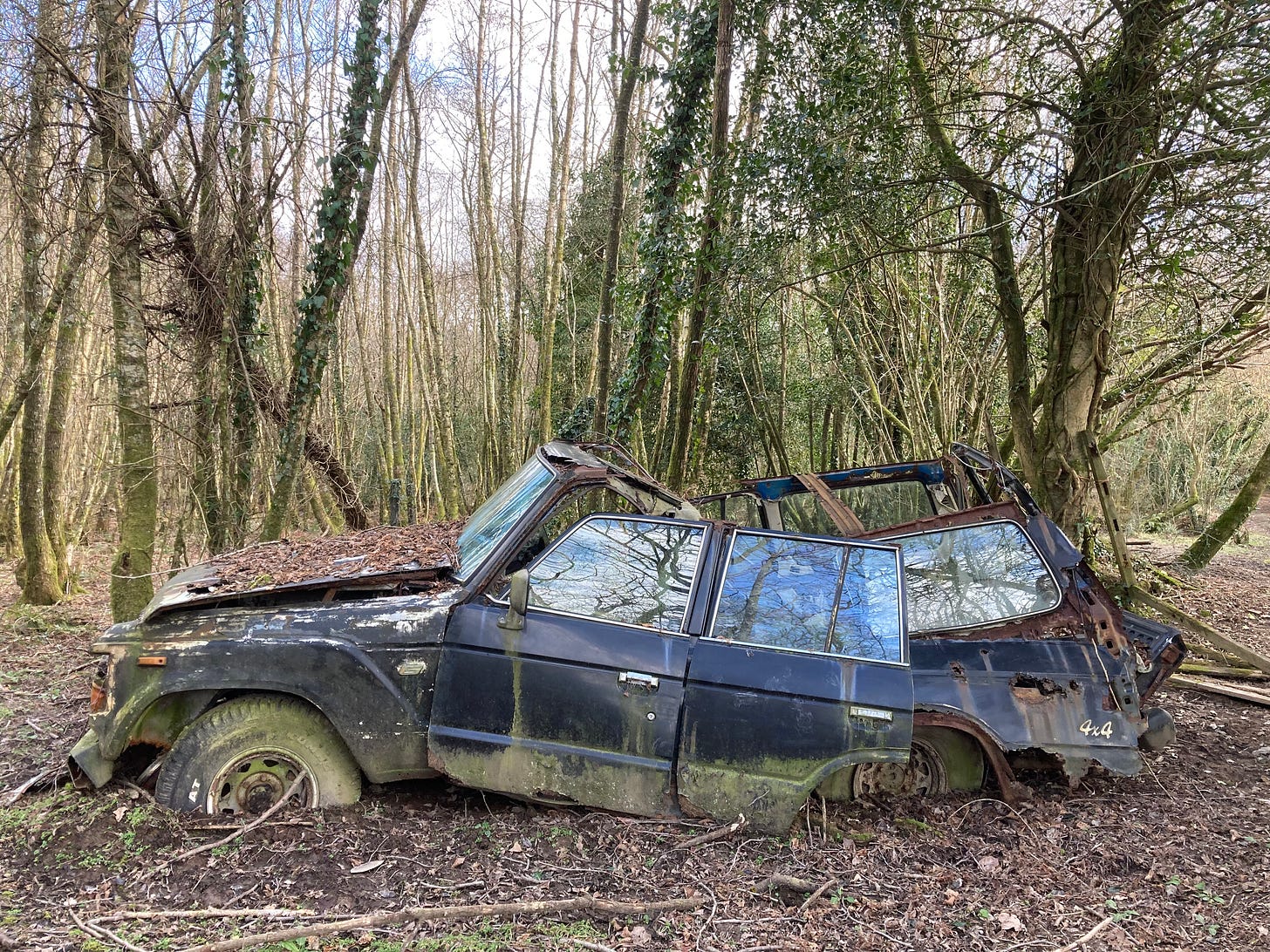
- We moved here, to Cornwall, at the end of September and instantly got Covid. Not mild Covid, either. Domineering hooligan Covid that’s still making its residual presence felt now. Directly after Covid, winter happened. Then we got poorly in other ways. Then winter carried on happening, then happened some more, then some more. Then some daffodils grew, conning many people into thinking winter might have stopped happening, but now winter is in the process of its unwanted encore, delving into its back catalogue and unimaginatively reworking the songs everyone always wants to skip, even when they listen to winter on vinyl and have to make the effort to get up and move the needle. I feel I have heard today’s too many times before: it’s a sort of two part segue thing called ’I Can’t Believe I Have To Order Even More Oil And Firewood/Why Do I Still Not Live In Sicily (Reprise)’. In the past I’ve dealt with it by throwing myself into winter’s landscape, letting myself get soaked and buffeted by its dark magic. This approach has been a little less appealing of late, with a herniated disc in my spine and a disabled partner to care for, but I’ve done my best, amidst all the doctor, dentist and hospital trips. It’s easy to think, on a Cornish beach in July, that winter doesn’t properly happen here, but it definitely does. I think of the desolate blasted terrain of the central backbone of the county, ten or so miles north of where I live, as the very essence of winter, in much the same way as I thought of the borderlands of the White and Dark Peaks in Derbyshire as the very essence of winter when I lived there. Yes, it’s a few degrees warmer here, but it’s still got plenty of ferocious moorland and not much light between October and March. The dead undergrowth still reveals rotting, abandoned cars. You still can’t drive more than a couple of miles in early March without seeing a badger or fox or pheasant’s innards spread across the tarmac. In a month or two, when the green wall is coming back, they’ll still be there, but we’ll be more protected from the sight of them and it will be easier to pretend that everything is fine and all of Britain’s wild animals are alive and happy. A pheasant was on its side in a lane a mile from home. It didn’t move as I drove towards it. I swerved slowly around it, assuming it was maimed, then left the car in a gate gap and ran back to move it out of the road. As I got within a couple of yards, expecting the worst, it woke up and trotted off. Nothing is more witless than a pheasant. The bagel I ate this morning has a higher IQ and would no doubt be far better to have on your side in a fight. I beep pheasants if they’re anywhere near the road, not because it generally does any noticeable good, but because I’m hoping that somewhere in their tiny brains they might remember roads are somewhere where beeps happen and are therefore to be avoided. They line the lanes going up to Bodmin Moor, waiting for cars to leap in front of. I always used to relish a walk on Dartmoor or Exmoor and always felt glad I’d done it. I never quite relish a walk on or near Bodmin but also always feel glad I’ve done it, but only just. I feel bad that I haven’t fallen in love with it, nor the town of the same name immediately to the west of it, especially as Bodmin also happens to be the name of my girlfriend’s mum’s adorable, infamously confused-looking cat. “Bodmin looked fucking grim today, in this rain,” I say. “Take that back right this instant!” replies my girlfriend. “He’s a lovely boy and always looks beautiful.” “The record shop in Bodmin is a bit pricey and the stock never seems to change,” I say. “Give him a break,” replies my girlfriend. “He’s trying his best to make a living as a independent trader in the middle of a financial crisis in a not very affluent town. And he’s not even got thumbs!” Near Exeter, as you drive in the direction of Cornwall, an electronic sign on the A30 tells drivers approximately how many minutes it will take to reach Bodmin. We picture him down there, an hour or so away, on the central reservation, meowing at the traffic in his inimitable, disorientated way.
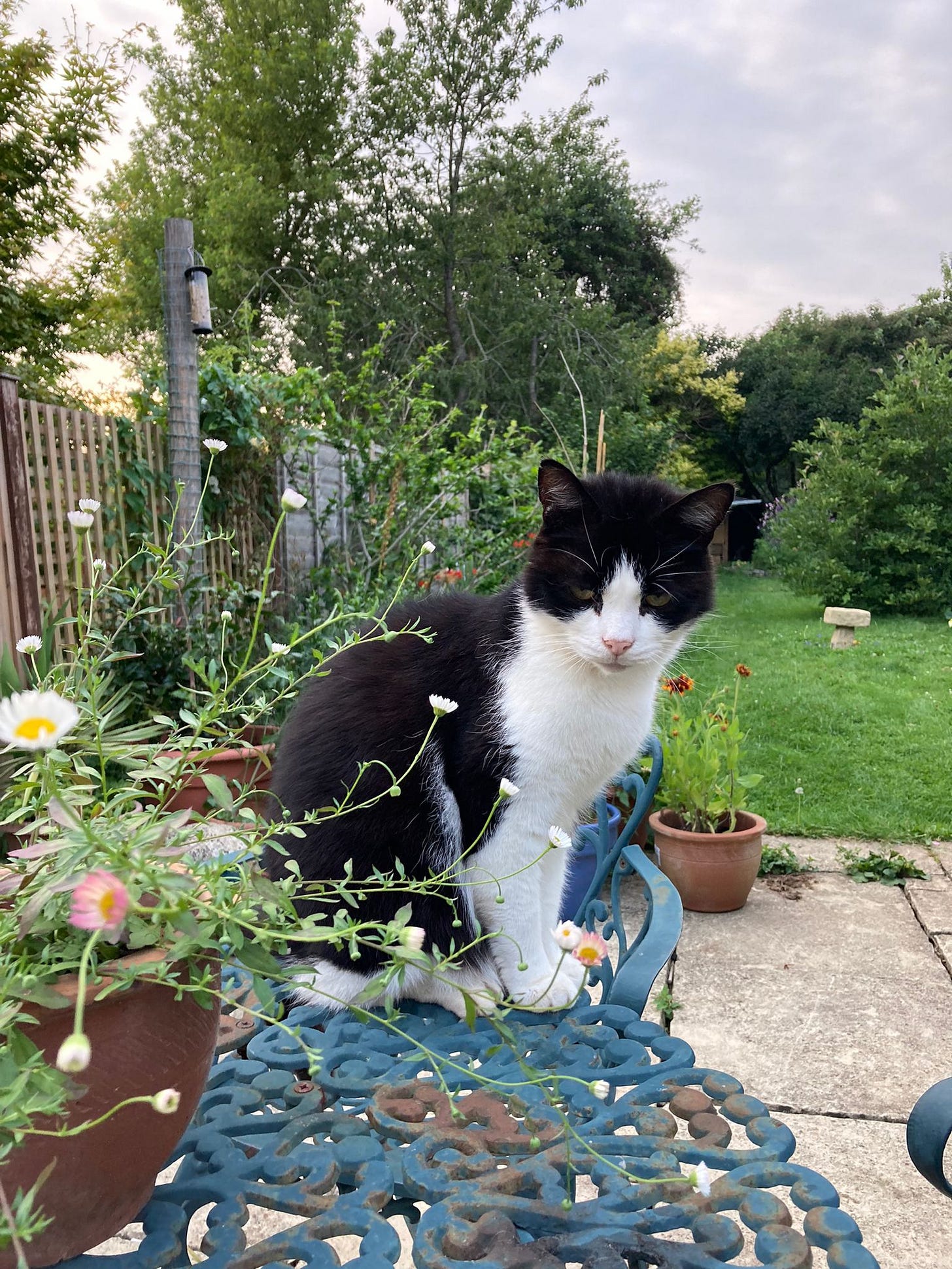
- I went swimming in Bodmin. He didn’t seem to mind, and I got an impressive number of lengths in, considering his size. One stranger repeatedly touched my feet and another, in flippers, worked an elaborate overtaking manouevre by swimming directly beneath me. It was busy and stressful, but that’s not Bodmin’s fault. He’s just trying to survive, as a black and white cat, running a leisure centre inside himself, at a globally difficult time. I should be swimming in the sea, but I’ve only been once so far this year and keep chickening out. I think about the day last summer that I leapt off some high rocks at the nearest beach to what is now my house and the way that, when I hit the water, my velocity was such that it flipped me upside down: I want to return to that me, staring at a shoal of fish with my legs above my head. Actually, maybe that’s why I have a herniated disc in my back? It’s not. It’s because I played golf and lugged heavy golf clubs around as a teenager, then many years later had a car crash, then immediately after that rescued a pregnant waterlogged sheep from the edge of a cliff, then eighteen months after that when I was just finally recovering from my whiplash, I had another small car crash, then another one, and in between I’ve carried heavy bags and sat for too long with my laptop in too many awkward positions. This last fact might be the most significant of all. But it’s winter. You want to get a load of work done while the weather’s crap, because soon there will be lots of unmissable outdoor things to do. And then there’s the work that has to go with the work. And by the end of it you’ve been sitting in one place for a long time and the only option is to get out and explore the rewilded remains of some industrial buildings from Cornwall’s thriving Victorian tin trade.
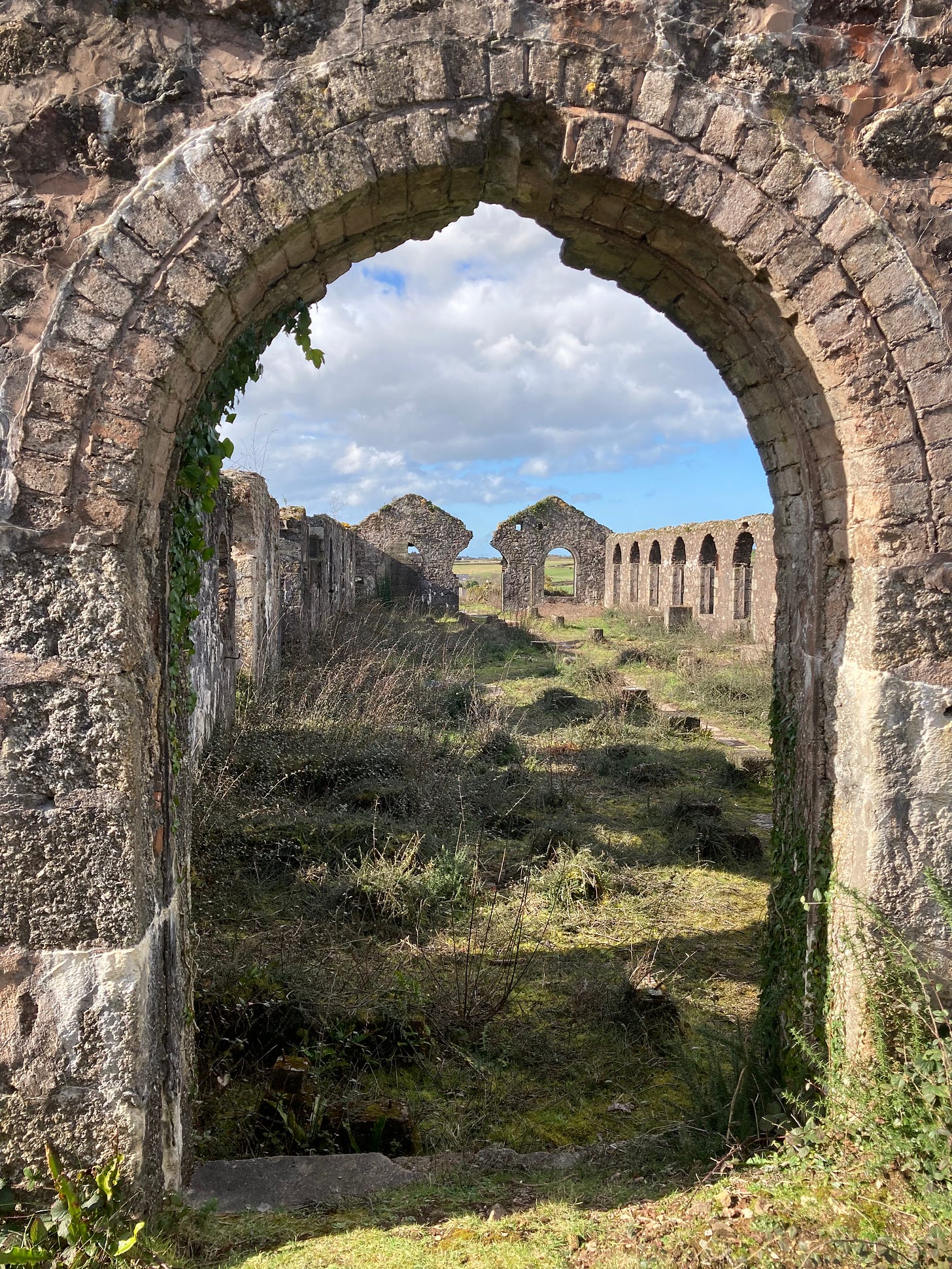
- Just after the Victorian era, when I was a baby, I came to Cornwall on holiday with my mum and dad and auntie and uncle and cousin. I don’t remember it, because it was more than 120 years ago and I was very small, but my family do, and not fondly: where we camped, just outside Redruth, reminded them a lot of the mining-dominated part of Nottinghamshire where we all lived. The general consensus was that it would have made more sense to have just taken the tents up the road to Worksop or Kirkby-In-Ashfield. It would have saved a lot of petrol, and there would probably have been less rain. These days, Redruth is the most gently gentrified of the once-deprived towns of the Cornish interior: it’s got a very good little record shop and secondhand clothes and furniture emporium, a vegan-friendly cafe and a fair number of stylishly-dressed young people on its streets. I enjoyed poking around Carn Brea, just beyond it, where there are such an overwhelming number of derelict engine houses from the copper and tin industry in such a small area that it feels like stumbling across the remains of an ancient civilisation where copper and tin mining was an entire religion. But my mining area past doesn’t make me feel closer to or more spiritually at home in my mining area present. You can be very interested in a place without fully harmonising with it and Cornwall is an example of that for me. After I’ve visited an area like Carn Brea, or the even more mysterious rewilded Tregargas Valley, where natural waterfalls flow greasy and grey with the run-off from the clay tip above, my urge to travel east grows. It’s not about wanting to go back to anywhere I’ve lived before, it’s just wanting to be in a landscape that feels like it’s giving me a nice hug. The southern fringes of Dartmoor, the Devon-Dorset borderlands, the bottom of Gloucestershire, the Herefordshire-Wales border: these are places that always feel like they’re doing that. Cornwall, with a few exceptions, doesn’t. It’s one of the most beautiful places on earth – even on its herniated central spine, away from all the tourism – but it’s just slightly outside my genre.
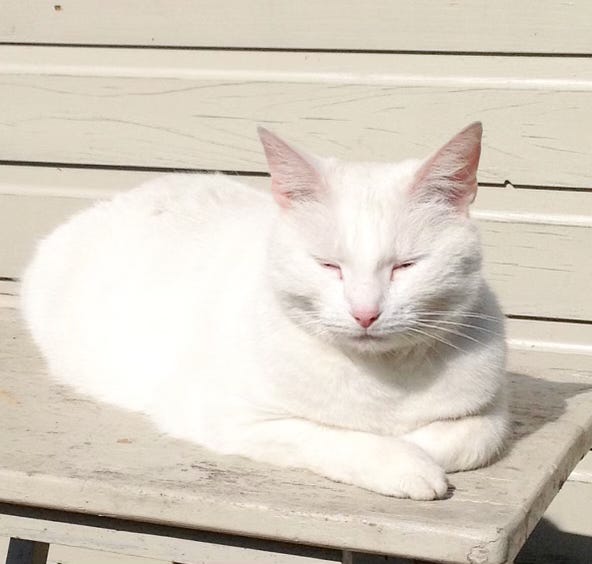
- I received a phone call just over a week ago which made Cornwall feel like an even more remote place than it has at any other point in the six months I’ve lived here. It happened at about 9pm. An owl was hooting from a tree overlooking the kitchen. My mum was on the other end of the phone, explaining that just a few moments ago, the softest and cuddliest of her and my dad’s cats, Casper, had died, very suddenly and unexpectedly. He’d been injured in a fight with a new neighbourhood rival a few days earlier but, after having an abscess lanced by the vet, had appeared to be recovering extremely well. There was a brief suspicion he’d been poisoned but it’s likely that he had simply suffered a heart attack, perhaps in the direct aftermath of more conflict with the same rival. He was almost twelve: not young, but certainly not old. Since he’d moved over from their next door neighbour’s house a few years earlier, he’d been a near-constant reassuring presence in my mum’s art studio, and a close friend to their other male cat, George. Being where I was, and acutely aware of just how devastated my parents were, the distance between us seemed much much greater than it had when I’d been living only 90 minutes closer to them. The problem was as psychological as it was geographical. If I’d been speaking on the phone from Devon or Somerset or Dorset, it would have somehow made a difference. The bleak central spine of my body’s landscape was feeling particularly wrecked at that point and I was in no state to drive to Nottinghamshire. Instead, I did what seemed the next most logical thing: I tried to locate my three cats and annoy them with an overbearing dose of clingy love. The first I found, as is so often the case, was Jim, the giant ginger lad who wandered over here from a barn a couple of fields away in early December and decided he wanted to make us his new humans. And there, if I had any doubts about whether moving here had been beneficial, was, and still is, the answer: becoming residents of Cornwall gave us the opportunity to have this utterly incredible, utterly soppy, utterly huge ardent pacifist cat in our life. I also came here to research part of a novel: a novel that, as it’s transpired, isn’t even going to be the next one I publish. That’s been educational and exciting and I still think it was the right decision. It’s a vastly interesting place. There’s a bird in the woods above the river that sounds like no other bird I’ve ever heard, and I’m yet to identify it. “I’m standing in the doorway because I smell of horse,” said a man in the village post office the other day. The water from the tap is more delicious than the tap water at any other house I’ve lived in, with the possible exception of the tiny spring-fed cabin where I lived in 2018. I’ve found out what a dumb buddle is*. I’ve learned a certain stillness in this place that feels part of my life’s recent upheaval: an ability to be in one building for long periods of time that I haven’t had for a while. All these excellent things would never have happened if I had never moved here, and I feel lucky to have had a comforting and quiet environment in which to experience a tough, long, debilitated winter, but home is somewhere else. I’m not sure where exactly. But that’s part of the fun. I’m not lost. I’m just having a thorough look at the map and planning my route.
* They were used to grade the pulp and separate the thinner bits of tin from the heavier particles
My latest book, Villager, is published in paperback on March 30th. You can pre-order a copy, with free worldwide delivery, here.
You can pledge for a first edition hardback of my next novel, 1983, here.


Hi Tom, I loved this piece, like all your others. Poor dear Casper. My most favourite Casper Tweet was one where he was leaning out of the window channelling Mrs Betsey Trotwood from David Copperfield, and yelling at people or (cats or dogs) to get off of his f****** lawn. I would love a greatest hits gallery of Casper (and George) if you have time to post it on twitter or instagram. Thanks.
Your thoughts on living in Cornwall are really interesting, thanks.
I live not far from the less popular and busy east Cornwall, near the Tamar and recognise some of the features you have noticed about the landscape.
A relative used to live on the Charlestown side of St Austell so I know the golf course walk and have seen the Poldark hunters who go to the little harbour expecting to see Aidan Turner selling ice cream.
The bit about winter’s back catalogue is great – very funny.
Physiome in Snozzle will sort your back out. https://www.facebook.com/physiomatteast/?locale=en_GB (Phernyssick Road just off the A391.)
Try going east a bit, Beyond Polruan, towards Lantic Bay then Lansallos, Talland and finally West Looe. East Looe is currently staring in Beyond Paradise, but disguised as some random place in Devon ffs, quite a lot of ruffled feathers about that. Looe does rather attract sunshine, the boat men sit and laugh at the clouds over Liskeard.
Just reading your post here, I think YOU should start writing!!!
Agree with lesley. Also up river from Fowey, to Lostwithiel. Grab a kayak and paddle….once he back settles.
Can totally relate to some of this. While consulting maps to check details, my friend and I have often been approached by well meaning blokes asking ‘Are you lost, ladies?’
Hahahaha.
I had forgotten that one.
RIP, Casper.